#Tvc meta
Text
The most underrated moment of all time in interview with the vampire (the book) is when Louis meets Lestat and he’s all seductive, making all these promises about eternal life and escaping his human burdens and transcending suffering, living his ultimate hedonistic fantasy forever, and then once the transformation is complete and Louis and Lestat are living together Louis realizes that Lestat isn’t the angelic other worldly being come to sweep him off his feet that he presented himself as, but is actually just a Guy. Fucking hilarious. Suddenly Lestat is 10 years older than Louis at most, his father is still alive, and he’s responsible for caring for him in his old age. He’s bitter and immature and his dad is dying and handling him is his priority first but he hates it, he’s just got average mortal problems and concerns. And Louis’s like wtf ? I’ve been scammed. So good! Lestat is just a guy actually he’s just like Louis, he doesn’t know anything. Vampirism doesn’t make anything more special rlly and ur family and responsibilities don’t go away once u drink the magic blood. I love that, it’s hilarious as it is so interesting for their dynamic. I annoys me sm that the show made Lestat so much more older then Louis bcus a good chunk of the foundation of their dynamic is just gone. Ugh
#the vampire chronicles#tvc#vampire chronicles#vc#interview with the vampire#iwtv#lestat de lioncourt#louis de pointe du lac#ldpdl#lestat iwtv#loustat#Tvc meta
665 notes
·
View notes
Text
Okay so here’s the thing. I freely admit I am Big Stupid. I forget things constantly. The Vampire Chronicles is a layered tale packed with constant retcons and gaps getting filled. Whole chunks of characters’ stories slip my mind on the reg.
So I understand I may be missing something major.
But.
From where I’m standing … I know that Armand was v upset when it happened, and given everything he’d been through to that point he’s absolutely allowed to be upset; but did Marius do wrong by turning Sybelle and Benjamin?
Hear me out: the rule of this universe wrt humans who tango with vampires is there’s only three eventual outcomes: death, madness, or vampirism. Obvs if Armand had his choice at that point in the series he’d have preferred them to have regular human lifespans and eventually die, but 1) given his history with Daniel, who knows if he wouldn’t eventually have changed his mind, and 2) it might not have been what they necessarily wanted for themselves. Cause the way both Sybelle and Benji talk makes it sound like they might’ve actually asked Marius to get vamped??
(And Pandora? Or wtf was Pandora even doing while all this was happening? She was there, what was she doing?)
Because here’s their response to it:
(…) Sybelle rose from the piano, and with her arms out ran to me. And Benji, who had been watching all the while, rushed to me also, and they imprisoned me gently in their tender arms.
“Oh, Armand, don’t be angry, don’t be, don’t be sad,” Sybelle cried softly against my ear. “Oh, my magnificent Armand, don’t be sad, don’t be. Don’t be cross. We’re with you forever.”
“Armand, we are with you! He did the magic,” cried Benji. “We didn’t have to be born from black eggs, you Dybbuk, to tell us such a tale! Armand, we will never die now, we will never be sick, and never hurt and never afraid again.” He jumped up and down with glee and spun in another mirthful circle, astonished and laughing at his new vigor, that he could leap so high and with such grace. “Armand, we are so happy.”
“Oh, yes, please,” cried Sybelle softly in her deeper gentler voice. “I love you so much, Armand, I love you so very very much. We had to do it. We had to. We had to do it, to always and forever be with you.”
Like, in the immediate aftermath, they’re both over the moon about it; they’ve even fed already. Later in the Prince Lestat era, they both seem fine; like I’m not recalling any major fledgling angst.
Claudia was eternally unlucky, and she was intensely lonely. Her relationships with both Lestat and Louis were complicated and strained (to the point that she tried to kill Lestat), she didn’t really have peers, and by the time she finally got a companion Armand was already engineering her death.
Daniel gradually went unhinged for a decade before becoming a vampire, and Armand might’ve blamed himself for Daniel’s full-fledged insanity afterward but it sounds to me like even if he’d somehow survived that horrible night he’d have lost his mind anyway. (By the way, who was it that kept Daniel fed while he was in that madness, huh?)
Benjamin and Sybelle are super lucky, relatively speaking; they have each other as peers, and Armand is somewhere between a peer and a guardian. From what we see in the PL era, they have their pursuits, they have a place in the vampire world — as fledgling vampires go, they seem to have as close to an ideal life as fledgling vampires get.
And like,, they got what they wanted: their Forever With Armand, with the sweet bonus of less physical harm to fear. And in the long run, after the … Veil-induced mania? wears all the way off, it seems like Armand isn’t that unhappy about it either.
So.
As much as Armand is totally allowed to have his feelings about it in the moment, all things considered it doesn’t seem like Marius “ruined” much of anything by turning them. At least not to me.
(Marius and Pandora? Tf was she doing?!)
#tvc meta#again i may well have missed smth#i know ppl super hate marius and everything he does#but idk this seems like one of his better moves?#marius de romanus#maybe the healthiest vampire family??
66 notes
·
View notes
Text
Someone asked me to write up a bit more of what Anne Rice was thinking making Marius a verna (a type of slave in Rome, a status from which we can infer he was manumitted). I've uploaded that here (intro excerpt below):
Marius in TVC: Implications of References to Roman Society
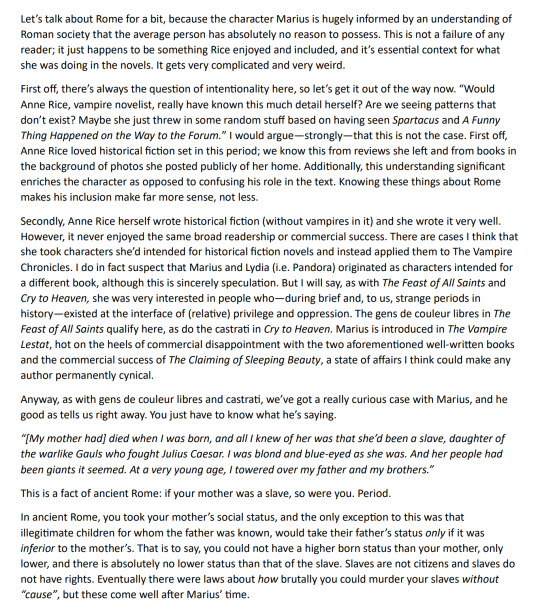
continue reading here.
Minimally, you'll come away having learned something about vernae and about the process of manumission (freedom from slavery in the Roman system, heavily implied to have occurred). I'm not an expert on the Servile Wars or manumission or what-have-you so there are a lot of direct citations in the link.
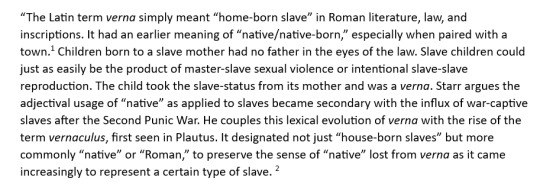
(- Dr. R. Conn)
#tvc#marius de romanus#tvc meta#reblog and I will spiritually buy you a hat#like on the astral plane
111 notes
·
View notes
Text
Just realised that Lestat going for young people in the cusp of life is him killing himself again and again. That was him until that night Magnus wrenched him from his own future in Paris.
3 notes
·
View notes
Text
Armand spent so much time trapped in a cult that broke him down and told him he was a monstrous creature who did not deserve love or compassion. And for centuries after, he struggled to connect to those he loved. But then the one (1) guy he ever makes into a vampire, Daniel, is the guy who believes in what a huge capacity vampires have for love. That they have eternity to love and be loved. It's just so beautiful.
#armand#daniel molloy#armand/daniel#armand x daniel#vc meta#devil's minion#the devil's minion#devils minion#vc#vampire chronicles#tvc#the vampire chronicles#just constantly marinating in thoughts about them and all the ways they really are exactly what the other needs so much of the time#i just love them so much
270 notes
·
View notes
Text
Thanks for tagging me @little-desi-historian! ❤️
YES, all of this takes me back to something I wanted to touch a lot more on in my original post when it comes to the historical male image, Percy, Lestat, and Matadors; because it truly does link back to how AMC is playing with dandyism and society's expectations about effeminate men.
Dandyism is a form of resistance culture. As I've said before, Lestat flouts gender norms because HE CAN do whatever he wants & get away with it. His androgyny's on a different level: effeminate or masculine, he's still a vampire, a SUPERnatural creature elevated beyond the bounds of social mores that determine what men & women could or SHOULD act/dress like. MANY people across social media have pointed to Lestat's limp wrists, long blonde "Barbie" hair and ESPECIALLY him dressing in drag in Ep7 as proof that he's the "wife/mother/woman/femme fatale" in Lousta's relationship, and THEN claim its either gender essentialism or homophobic/racist to say Louis is CANONICALLY female-coded one in BOTH the books and show (as AR said so). But no, Lestat in drag was a power move, because he doesn't care what anyone thinks/says/does--he'll just eat them. Mockingly eating the baby in a dress was a deliberate bastardization of motherhood/womanhood. Louis is called every homophobic name in the book by those expecting the black man to just take being insulted, but MARQUIS de Lioncourt DEMANDS being crowned KING of Mardi Gras, Krewe of Raj, & he'll show you exactly what he thinks about your silly homophobic hypocritical human society: You're just "the MEAT," let them eat KING Cake--you're his FOOD. Eff y'all, I'm dressed to KILL you, & laugh doing it.
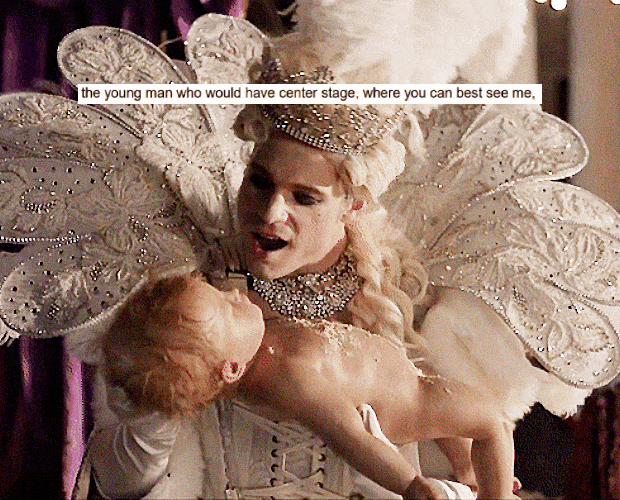
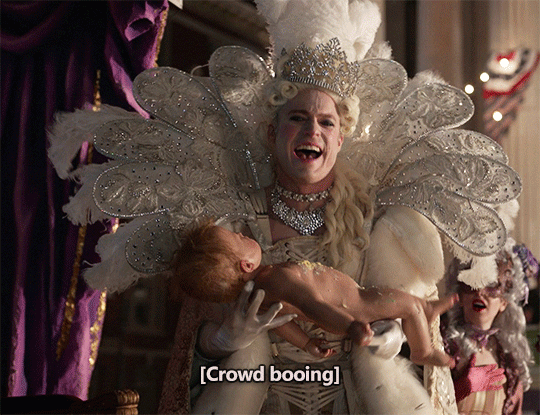
Lestat's behavior is not only derived from the time period he was born & raised in (the Rococo era of so-called "effeminate" high class dandies--a la Percy Blakeney, etc). Lestat is the embodiment of PRIVILEGE: a powerful rich white male vampire, who leans into being foreign/French White to excuse anything he does that people find strange/off/unnatural/dangerous--all the red flags. 🚩🚩🚩
And red flags brings me directly back to matadors/toreros.

@toscrollperchancetomeme
😂 TYSM! Sam Reid dropped so many juicy deets; I couldn't resist! There's so much depth to the Matador outfit, beyond the gendered aspect of bullfighting that I discussed before. Let's go back to what Sam said about Lestat, and delve deeper into matadors:

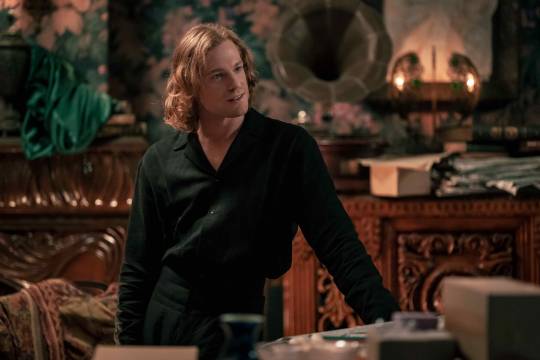
The most iconic apparel worn by toreros ("bullfighters") / matador de toros ("killer of bulls") in Spanish bullfighting is the Traje de Luces, the "Suit of Lights." The colors are usually bright & vivid, as part of the showmanship & pizzazz. Darker palettes are less common, as shiny sequins (the luces/lights) became part of the standard fit.


However, Lestat's all-black Matador outfit from what Sam called the "villain sequence" in Ep5 seems to be loosely following the style of a different but very closely related outfit, the Traje Campero "Rural/Countryside Suit" aka Traje Corto ("Short Suit").
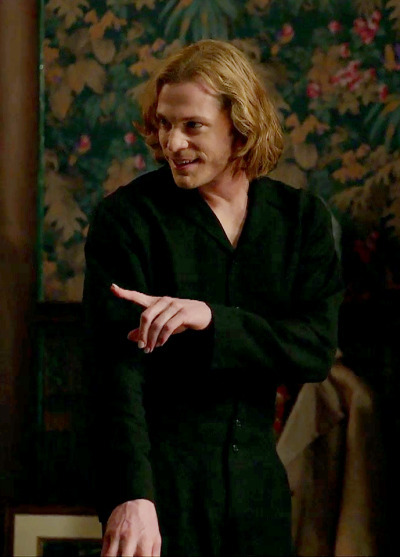
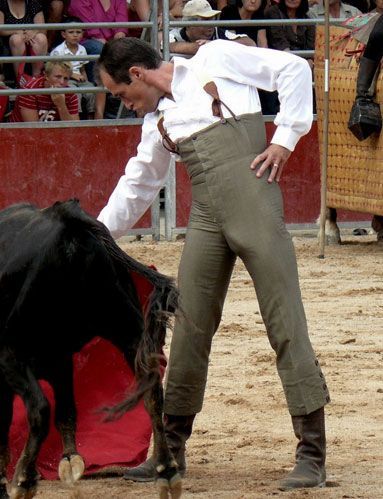
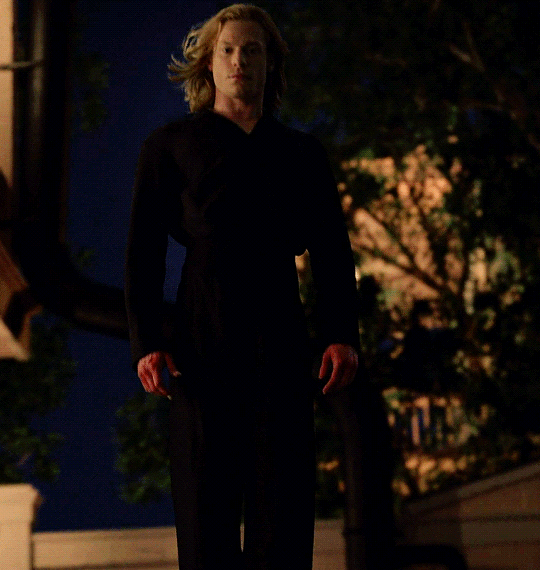
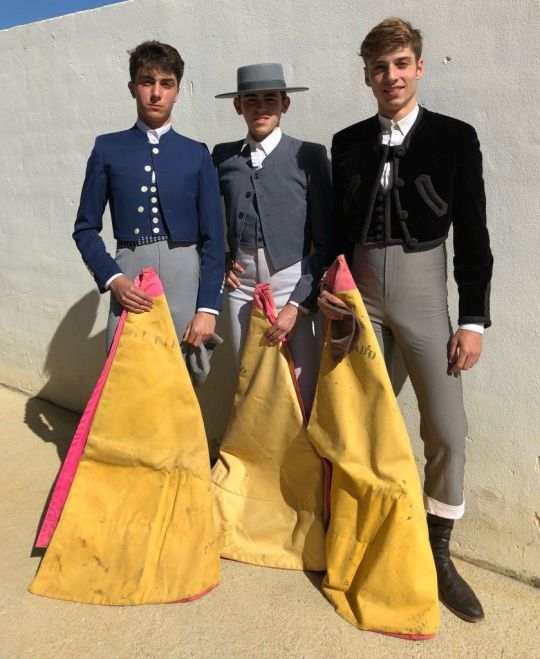
(These costumes are typically worn during ceremonial parades and a very specific festival I'll get back to in a moment, cuz it's important.) Unlike the Suit of Light's sequins & silk, the Rural Suit is made of suede, leather, or velvet, in dark muted colors. The pants can be light or dark, striped & patterned, with or without chaps (also found in gentleman's uniforms of military officers and cowboys).
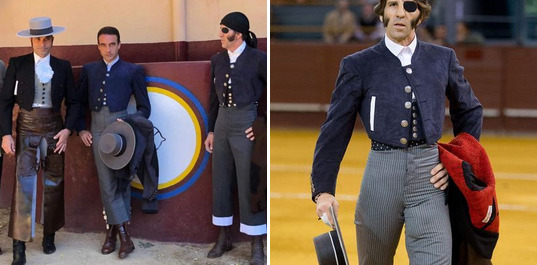
The trajes originated from "the flamboyant costumes of the 18th-century dandies and showmen involved in bullfighting, which later became exclusive to the bullfighting ritual." (Wikipedia)
The ancestor of both trajes (luces/campero) is traditional 17th-19th century Andalusian clothing (Andalusia being the home of Spanish bullfighting), closely associated with a very particular type of masculine dandyism. (The campero/corto is also the costume worn by Andalusian male flamenco dancers.)
"Before the 17th century the profession of bullfighting did not exist as such, and the fighters did not wear luxurious & shiny trajes de luces, but instead normal clothes of the time according to the social class to which the bullfighter belonged. The first bullfighter trajes de toreros appeared in the 17th century, when professional bullfighters from Navarre & Andalusia wore characteristic garments with their gangs to participate in performances and thus differentiate themselves from other bullfighter bands." (translated/truncated from Spanish website)
In the mid-1700s, Francisco Romero revolutionized professional bullfighting by establishing the first matadors who fought on foot, heroically fighting the bull face to face with swords & the muleta (iconic red flag) in a dance-like performance, dressed in a suede/velvet coleto (jacket), a precursor to the traje campero. Romero (from a carpenter family) wanted to show off & stand out from the nobility, and changed the game entirely, through a form of social resistance-turned-innovation.
"At that time, bullfighting on horseback was more important, which was considered a sport and not a show. Bullfighting on foot was not yet widely recognized." (translated from Spanish website)
Bull-killing on horseback was practiced by Spanish noblemen, attended by lower class assistants on foot. Romero was the first to make on-foot matadors the stars of what was increasingly becoming a dandified show/performance/dance. Matador Joaquin "Costillares" Rodríguez introduced even more showmanship, competing against Francisco Romero's grandson Pedro Romero (famously painted by Goya--bottom right).
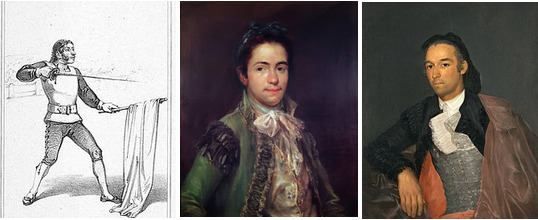
For his matches, Costillares (middle) dressed in flashy silks, threaded in shiny silver braiding; the precursor to modern traje de luces. Like Francisco Romero (left), Costillares wanted to show off & stand out; and revolutionized the male image of the bullfighter through clothes.
In 18th-19th century Andalusian Spain there were 2 types of dandy: the French-imported upperclass petimetre (effeminate dandy), and the indigenous working class majo (masculine/macho dandy).
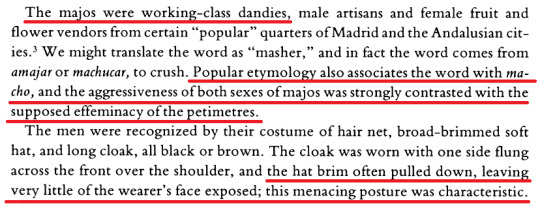
Noyes, Dorothy. “La Maja Vestida: Dress as Resistance to Enlightenment in Late-18th-Century Madrid.” The Journal of American Folklore 111, no. 440 (1998): 197–217. https://www.jstor.org/stable/541941
The majo, like many dandies, became the peak of Andalusian fashion, across all social classes; and torero/matador outfits weren't the only ones to take cues from them:

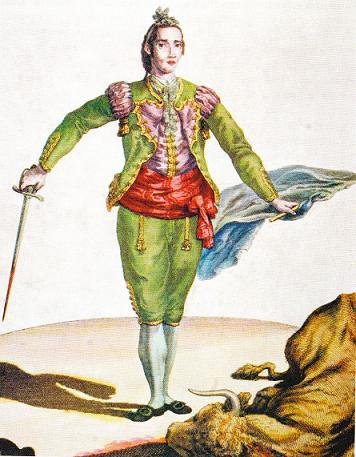
18th-19th century majos "distinguished themselves by their elaborate outfits and sense of style in dress and manners, as well as by their cheeky behavior. The majos outfits were exaggerations of traditional Spanish dress. The style stood in strong contrast to the French styles affected by many of the Spanish elite under the influence of the Enlightenment. Majos were known to pick fights with those they saw as afrancesados ("Frenchified" – fops)." (Wikipedia)
The majos' flamboyant/cheeky/saucy/exaggerated behavior was aggressively masculine; a lower/working class resistance to social mores imposed on them by (foreign) elites, whom they saw as more feminine, and FOUGHT against, to reaffirm their masculinity. These dandies were violent, brazen non-conformists; as beautiful & stylish as they were dangerous. And matadors/toreros knew that the bullfight was the perfect arena to exemplify the spirit of the majos through the dandified performance art/sport of killing bulls--a universal cultural symbol of masculine prowess & strength. Spanish bullfighting used to belong solely to the aristocratic equestrian sphere. Lowly pages/assistants like Francisco Romero (dressed in the precursor to the Rural/Countryside Suit), were the first to buck the system by killing bulls on foot--he likely didn't own a horse. The Romeros were from a carpenter family. Costillares was the son of a butcher. But through bullfighting they gained social status and became icons of masculinity--and dandies.
Lestat--the nouveau riche son of a poor country marquis--insists on being all the beautiful things he is without apology: masculine & effeminate alike. But like I said, it was no coincidence that Carol likened Lestat's Ep5 villain outfit with matadors--he's fighting Louis for dominance in their household, and reaffirming his place at the top of their very gendered social hierarchy, as a warning to BOTH "the housewife" AND "the prodigal daughter" he feels are threatening his authority as their Maker, so he defeats them BOTH.

Carol Cutshall initially designed Lestat's matador pants as pajamas--loungewear. (Lestat's CASUAL & comfortable in his ability to KILL--matador means "Killer" in Spanish--and remember what I said about Louis & Claudia being put on the same parallel level in Ep5, when Claudia's attacked by "Killer" aka Bruce.) Sam said Carol made several versions of the pants; and yup, they're foreshadowed in Ep5 when Lestat first starts arguing about Louis' depression, then they pop up again in Ep7 during the Murder Plot--two instances @dwreader brilliantly linked Lestat (& Stanley Kowalski) wearing wifebeaters. (Listen, Carol, I just wanna talk.... 😅🔫)
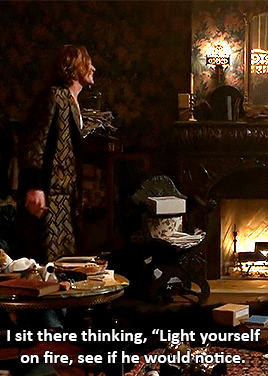

And here's my last points about Lestat's matador outfit. First there's the irony of Lestat (who grew up poor in rural France) wearing the something very similar to the matador/torero's Rural Suit, traje campero (aka Short Suit (traje corto)). But what's more interesting is that that type of Short/Rural Suit is usually only worn during special festivals called the Tienta ("trials"), not the regular corrida ("bullfights").

These Tienta are trials for young and immature bulls to be tested in the ring, to see if they're fit for breeding/fighting. 🤯 FLEDGLINGS. And who's Lestat's young bull? "Built-like-a-bird" Claudia. Who's the immature bull? The "biggest rat eater of them all," the under-developed "botched" vampire Louis. During these trials, veteran matadors can show off their skills; and novice bullfighters are shown the ropes and prove themselves. Like I said: the matador wins again.
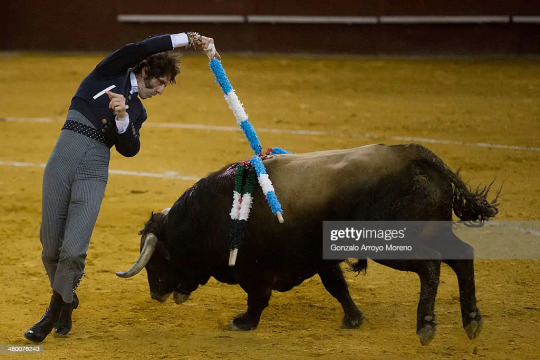
God, even the way Lestat dragged Louis' bloody body out of the courtyard by the jaw/neck resembles the way the defeated bull--bled out & stabbed in the neck--is dragged by the neck out of the ring.
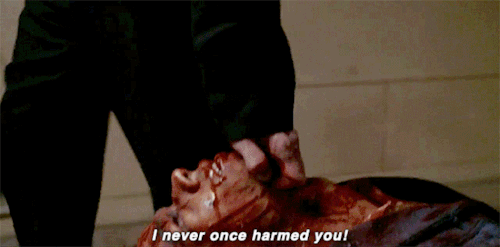
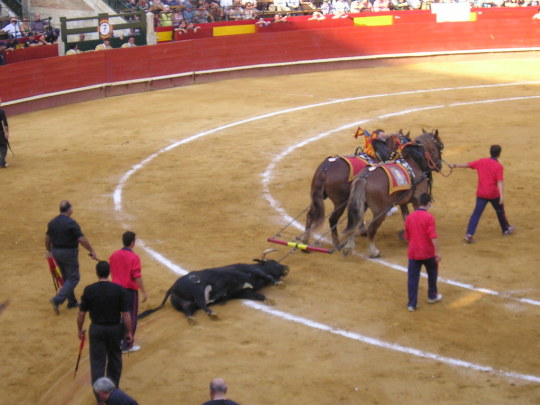
And remember what I said about Lestat and FOOD. Cuz what happens to the bulls after the matadors kill them? They're sent to the slaughterhouse to be butchered for FOOD. People EAT the bulls.


So yeah, my whole point in this post and my first one is not to sleep on guys like Lestat, Percy--or even other famous dandies like Valmont from Dangerous Liasions/Cruel Intentions (mentioned by both @little-desi-historian and @dwreader)--just because they're effeminate--especially when they're emulating mannerisms from a time period where the model of what made a fashionable gentlemen/good breeding/elite society did NOT match modern expectations about gender. People are getting distracted by Lestat's yaasified manner, not what the show itself is signalling through the relationships he has with others.
This show is deliberately painting Lestat as a villain through Louis' & Claudia's perspectives, as they were the ones who suffered under his Reign of Terror. The symbolism behind the matador-inspired costume used in Ep5 reflected gendered social hierarchies embedded within bullfighting culture (in Spain, women only started being allowed to fight in the 19th-20th centuries). Dressed in clothes resembling that of a matador, Lestat beating & defeating Louis mirrored the defeat of the emasculated bull, and the reification of the victor's masculine prowess at the top of the foodchain.
#the vampire lestat#lestat de lioncourt#male fashion#fashion history#gender inequality#read a dang history book#operation matador#iwtv tvc metas
352 notes
·
View notes
Text
Okay. I think enough time has passed. I'm ready to confront this.
I finished re-reading IWTV a few days ago now, and this paragraph fucked me up then, and continues to fuck me up now 🙃

Armand obviously knew what was going to happen. He knew that the theatre vampires were going to be coming for Claudia that very same night. He essentially warns Louis about what's to come.
"Louis, come with me tonight," he whispered suddenly, with an urgent inflection.
Armand is desperate to get Louis to go with him there and then, so that he doesn't get caught up in the theatre vampire's 'business', so to speak. It's got nothing to do with Louis, he doesn't need to be punished, as far as Armand's concerned.
When Louis rejects this, and says he can't go with him tonight, there's not really anything Armand can do, but to just accept that that's how it's going to be. He doesn't want Louis getting caught up in the situation, but he can't say anything more, unless he gives himself and his involvement away.
I watched him turn away and look at the dark night sky. He appeared to sigh, but I didn't hear it.
For only a moment I hesitated, mocked by the pounding of my heart.
It's as if, deep, deep down, Louis knows there's something wrong. He knows something's coming, and that whatever it is, it can't be any good. And I think he knows Armand has something to do with it.
But Louis' blinded by his love for Armand, and Armand's love for him. He's blinded by the possibilities Armand could give him, and any further knowledge he may have to share.
Louis doesn't want to face the truth. He's had one not so great experience in love before, and he's not willing to let that happen again, even if that just means being in denial about it. He so desperately wants to believe Armand has his best interests at heart, and that there's no possible chance that he could ever have any malicious intentions, let alone follow through with them.
He's clinging onto hope.
But ultimately, that delusional hope ends with Claudia dead, when Louis should've just listened to her warnings.
Of course, Louis isn't entirely responsible. Armand already had Louis, he didn't need to worry about Claudia anymore. Louis literally even says so himself. He tells Armand he already has him. And I know that's not the only reason for Claudia's death, there's so much more to it than that, but it was apart of it.
I think either way, Claudia was probably going to end up dead, but more could've been done to prevent it. But the blatently obvious warning signs were ignored, along with Armand's desperate need to have Louis.
#i talked about this on the gc when i was reading it#but i need to let it out here too#i was too sad about it at the time (i still am lbr)#but like i said i'm ready to traumatise myself with it again now 🙃#i love louis/armand but goddamn#does this section fuck me up#louis de pointe du lac#armand#claudia#loumand#interview with the vampire#iwtv#vampire chronicles#tvc#vc meta#my vampire chronicles
68 notes
·
View notes
Text
One of the things that comes up a lot in meta on the vampire chronicles is trying to delineate between "this is being treated as a kink fantasy", "this is fictional trauma beinf sexualized", and "this is being treated like real trauma would be" and I think the interesting and almost unique to itself aspect of TVC is that...it's almost always all of the above.
I've been thinking about David and Lestat's respective turnings lately and what strikes me about both is how they don't really neatly line up into "portrayal of horrific trauma", "rape fantasy", or even "cnc fantasy" (hear me out, we'll get there), but are an uneasy mixture of all of them at the same time.
Disclaimer: I am going to be talking about rape in a fictional story both as a traumatic violence and as a fantasy. I am coming at this from the point of view of someone who enjoys kinks, including nonconsent in fiction, and who is a real life survivor.
Using David's turning because most of the discussion around it is neatly in the same one or two places, we see it treated as all of these things in turn.
Lestat undeniably rapes David. That is not only the implication from blood drinking as a metaphor for sexual desire, but explicitly the language used:
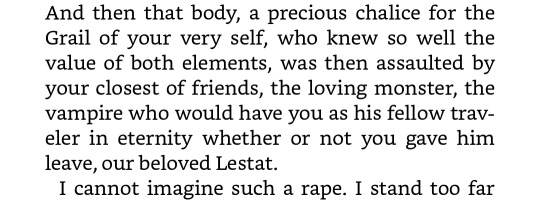
There are scenes of genuine anguish after the assault:

At the same time, the scene is, at least in my opinion, pretty sexualized! We linger in descriptions of David's body, of Lestat's pleasure in this monstrous deed.


And if this was all there was to it, I'd feel pretty comfortable putting this (and the many situations which mirror it in TVC) as a dead dove sort of situation. It's erotic horror, and this is both erotic and horrifying. What else did you expect?
And yet.
Let me make a relevant digression:
Up until 2012, when new research started coming out, the most popular theory for why rape fantasies are so prevalent among women was something called sexual blame avoidance. The idea being that women's sexuality and desires are so shamed by society as a whole that fantasies wherein they are forced allow them a guiltless way of experiencing desire.

This actually appears to not be the case for most people with these fantasies, but it certainly still is for many, and, possibly more relevantly: when these books were written, this would have been The theory on rape fantasies. That rape fantasies are a manifestation of desires that one feels ashamed of, so the fantasy of being forced removes one's agency and thus blame.
And here is David, having been raped by Lestat, saying he really did want it, he just couldn't allow himself to want it.
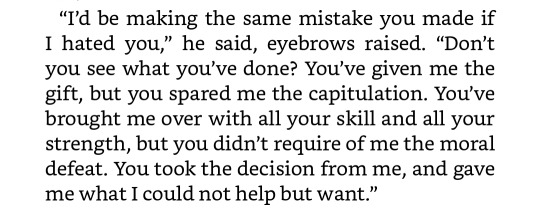
David had a desire he felt shame for desiring, and Lestat took away that shame by forcibly acting upon it.
It's easy to read this as simply rape apologism, and I can't stop anyone from reading it that way. And I don't and can't really know what Anne was thinking in this or in any number of other scenes that encompass erotica and horror and the comfort of fantasy all at once.
All I can do is say that the first thing I thought of when reading David's speech was how it felt directly lifted from any number of conversations I've had with other survivors on the appeal of cnc scenes. All I know is how I felt reading this and any number of other scenes in this series, which was: oh, finally someone understands what the fantasy is about.
But I think what trips people with that is that these stories aren't "just" short or erotica without weight. These are long stories with character development and emotional weight and real explorations of trauma. And I don't think that's inaccurate! I think they are that. I think these are, at least to me, also long explorations of kink fantasies and how the dynamics of those fantasies, removed from the need for consent and risk awareness of the real world.
Lestat can rape David and it can be something traumatic, something erotic, and something he ended up believing he wanted, because it's not one or the other in this universe. It can be an exporation of cycles of trauma, erotic horror, and long form kink fantasies written with real emotion, all at once. We don't have to choose just one - and I don't think Anne did, either.
42 notes
·
View notes
Text

This post is the first in a series where I attempt to untangle the most mysterious aspects of Marius's mortal life.
Here I attempt to tackle the question of his political life in Rome.
DISCLAIMER: I would like to preface this by acknowledging the obvious, which is that I doubt Anne actually put this much thought into Marius’s back story. Additionally, when I hit post on this, I will be done thinking about the topic. Meaning: my mind is largely made up on this particular matter. I've done as much research as I want to do, and I've done the amount of arguing that I want to do--which is none. None arguing. This is more or less just a very researched headcanon, ignore if you like.
We of course are introduced to Marius in The Vampire Lestat. TVL is where we get the most insight into Marius’s life as a mortal--more so than we get in even his own book, Blood and Gold. We also gain additional information from Pandora’s story.
Here is what we learn about mortal Marius:
He was the illegitimate child of a wealthy Roman man and a Keltic slave woman
In B&G, he claims to have been high ranking in one of the legions, though he never saw battle
He claims to have later been a Senator, which means his father would had to have been of the Patrician class or a plebeian who became so rich he was promoted to Senatorial class
He never married
This is where we run into our first inconsistency in Marius’s back story.
In Blood and Gold, when Thorne asks if Marius was a soldier, this is how Marius responds:
Marius shook his head. “A Senator,” he said, “a maker of laws, something of a philosopher. I went to war, yes, for some time because my family wished it, and I had a high place in one of the legions, but my time wasn’t very long and I was home and back in my library. […] I never really knew battle. (B&G, p. 28-29)
Meanwhile, in Pandora, Lydia pleads for her father to allow her to marry Marius. He shoots her down, saying:
[…] But believe you me, the Emperor himself would not approve of you marrying such a mad wandering historian as Marius! He has never served in the military, he cannot enter the Senate, it is quite impossible. When you marry, you will marry well.” (Pandora, p. 55)
As previously stated, it is impossible to know if this is just Anne’s love of unreliable narrators at play, or if this is a lack of her remembering what she’d stated in previous books. But for our purposes, we will treat this as being purely a matter of unreliable narrators being at play.
So what’s the truth?
We can figure out who is telling the truth by looking at Roman laws of the time. The question is “Was Marius ever actually a Senator?”. There are three avenues that could lead us to the conclusion that he was; but if he isn’t seen to meet any of these requirements, it is safe to assume he is lying to Thorne.
Fortunately, we have enough clues about which avenue(s) would be most plausible (if any) just from the information provided by Marius himself.
The oldest male of a Patrician family (or the eldest son, if the father were infirm) could become a Senator
The same could happen for the son of a plebeian family if his father had become wealthy enough to jump to Senatorial class
So from what we know of how he was treated by his father (taken under his control--IE: adopted--and given an education and unlimited resources for his travels, etc.), he was seen as being equal to his legitimate brothers.
The Institutes of Gaius also detail several ways that Marius could have become a Roman citizen even if his mother had not been freed.
So with the problem of his parentage and his related rights out of the way, we are left to ask: Was Marius the eldest son?
It’s not stated explicitly where in birth order Marius falls, but I suspect he is not the eldest son due to this line:
And her people had been giants, it seemed. At a very young age, I towered over my father and my brothers. (TVL, p. 397)
Towering over your younger siblings isn’t so remarkable as to need making a point of. And so it stands to reason these brothers Marius talks about are older than him.
The third path to becoming a Senator is the longer path, and it begins with serving in the legions and then rising slowly through the ranks of the lower offices.
It certainly seems as though Marius is implying that he took the last of these routes to becoming a Senator. Which would be rising through the ranks of the Cursus Honorum.
But perhaps the most damning evidence that Marius is lying here is time itself. Marius simply did not have enough time to climb the ranks of the Cursus Honorum before he was turned at the age of 40.
Here are the facts:
The first time Pandora sees Marius, she is 10 and guesses him to be 25 years of age.
We know he was not serving in the military at this time because of two laws: The one prohibiting soldiers to marry, and the Lex Julia de maritandis ordinibus requiring all male Roman citizens between the ages of 25 and 60 under the rule of Augustus to marry.
On page 51 of Pandora, Marius attempts to ask for Lydia’s hand via her father. On page 52, he explains to her:
“Well, that sort of wanderer and dreamer likes nothing better than to betroth himself to a young girl of ten because it means she is not old enough to marry and he has years of freedom, without the censure of the Emperor. They do it all the time.”
If Marius were already enlisted, he’d be too early into the required ten year service to be worried about securing a wife. But if he weren’t serving, the matter of marriage would become more pressing, as an unmarried man of his age would be expected to pay extra in taxes for continuing to be single.
Ten years in the military was mandatory for securing political office (though some wiggle room was given there).
When we next see Marius, Lydia is 15 and so Marius would have been 30.
As previously stated, Lydia’s father says on page 55 of Pandora that still at this time, Marius has never served in the military and thus cannot enter the Senate.
And while it is possible that her father was lying just because he didn’t like Marius, Pandora’s reaction to his proclamations lead me to believe that he wasn’t, as does this passage:
“[...] why don’t you marry me to Marius? I don’t understand it. I’m rich. He’s rich. I now his Mother was a wild Keltoi princess, but his Father has adopted him.’
My Father said witheringly, ‘Where have you learned all this?’ [...]
‘I don’t know; it’s common knowledge.’” –Pandora, page 55
It makes sense–the Patrician class was a small group in comparison to the plebians. And people have always been the same IE: gossips. It would make sense that the basics of Marius’s background, his station in life, and how he’s been biding his time would all be known to Pandora in at least the vaguest way. She doesn’t refute her father’s claims about Marius’s life as a loafer because she knows it to be true already.
And this is a Marius of 30 years of age. If he completed the required 10 years of service, he’d be 40. If he were allowed the wiggle room others were afforded, he could have ended his service as early as 37 years of age.
And it still wouldn’t matter.
Because under Augustus (the Emperor who ruled from the time Marius was 3-4 years old until about four years after he was turned), freedmen could not run for office, nor could they be made part of the senatorial class.
Marius describes himself as “illegitimate” several times and even tells Lestat that his mother died when he was born–implying she died in childbirth (page 397 of The Vampire Lestat).
It is not a huge leap in logic to assume Marius’s mother never received formal manumission, as Marius claims all he knows of her is that she was once a Celtic princess and a slave. It stands to reason that if Marius's father ever freed his mother, he would know about it–especially since his mother being freed at his time of birth would have made Marius optimo jure, thus giving him full rights as a Roman citizen.
Because all children born to slave women were considered slaves, it also stands to reason that Marius’s father adopted him via manumission, and since the freedman in that situation would take on his former master’s nomen gentilicium and then enter into a pseudo-paternal relationship with him, it stands to reason that Marius’s father would treat him as a son and give him freedom, money, property, etc.
But he would still not be eligible to become a Senator.
And it is for those reasons, I believe Marius was never a Senator, and indeed never served in the military, either.
Sources:
75 notes
·
View notes
Text
nsfw..
Daniel Molloy is the monster in the closet to me. He’s the ideal son from the middle class suburban white family who seemed guaranteed to make his dad proud, ends up corrupted by literal blood lust, the desire for eternal dick up his ass so desperate that he would kill and die for it. Danny Molloy son of Daniel Molloy jr son of Daniel Molloy sr turned twinkish journalist going around shady bars asking seductive young people for their “stories” ogling the ghost of a man with the sharp cheekbones and the hungry eyes because something in him wants to burn out just to see how bright the fire would be, to feel that warmth. Danny who used to go to church on Sundays in his button up and tie and ride bikes in the evenings with his pals before family dinner now breathless and moaning while the devil himself skinks his teeth into his neck like a beast, wanting more, wanting it to go on forever. I bet his mom teased with the other new mothers about how one day her son would be a heart breaker amongst their then infant daughters, now he’s turned on at the thought of drinking another man’s blood. Now he begs every night to be with his violent predatory bug lover for eternity no matter the small price of killing every night forever, never to see God’s light again. I am so proud of him 💕
#This is my head canon about Daniel being a family disappointment keep scrolling#the vampire chronicles#tvc#vampire chronicles#vc#armand#iwtv#interview with the vampire#Daniel molloy#devils minion#queen of the damned#qotd#armand x daniel#daniel x armand#Tvc meta#Iwtv meta#louis de pointe du lac
195 notes
·
View notes
Text
I’m new to this fandom so I may be speaking out of turn, but the concept of ship wars here of all fandoms is baffling to me
Like are all these vampires canonically not part of maybe a handful of big messy drama-filled polycules worldwide?? Like 5 tops?
(Except Lestat at some point at least tried to fuck basically everyone, so really one massive polycule lol)
#multishipper elvella strikes again#tvc meta#elvella rambles#like c’mon gang#not to invalidate anyone#but for example the idea that loumand ‘invalidates’ loustat is objectively hilarious#like are they all baptists in covenant marriages or something?? 🤣 🤣
3 notes
·
View notes
Text
Blood and Gold thoughts
What I love so much about Thorne and Marius is that Thorne approaches everything like a norseman. He wakes because he needs to complete an oath he swore, despite his vampiric emotions not being fully invested in that kind of simple solution anymore. Marius then presents him with a vastly different perspective, a more philosophical and rational approach, but the core of Marius’ struggles in Blood and Gold is that his emotions are too strong for logic and Roman civility, as far as that is even a real thing.
Thorne swore revenge, but he no longer really wants it and Marius knows he should be above revenge, but he needs it or his lingering hatred of Santino is going to destroy him.
So they meet, they talk, they fall in love the way Ricean vampires always do, and become blood brothers in a way they both recognise as a binding pact. That means that in the end Thorne fulfils his own sworn revenge through alleviating Marius’ suffering and it helps both of them move on.
Blood and Gold is very much a book about faith and Marius, to whom all faith is poetry, tends to be drawn to people who find genuine peace in faith, even when it hurts them, but in Thorne’s case, his faith helps Marius move on because he can embrace “crude” rituals in a way Marius can’t let himself do.
I want to talk about why Marius can’t get past Santino as well; it has so much to do with Armand and Pandora, the way they embrace faith and how that ties them to Santino despite how cruel he has been. Marius is not just angry at Santino for nearly killing him or for hurting Armand and the boys, he is angry, lastingly angry, at him for connecting with Armand AND with Pandora - they both have actual relationships with Santino, despite his zealotry (a zealotry Marius’ finds especially ridiculous because he was alive before Jesus was even born) and Marius cannot bear it.
Marius could have forgiven Santino for burning his Venice life to the ground, but he can never forgive him for understanding Armand and Pandora better than he does in some ways and for that understanding to blossom through a pain that is utterly pointless to Marius.
#vampire chronicles#vampire chronicles meta#blood and gold#Marius de Romanus#vc#tvc#this is messy#I have so many thoughts#I love Marius so much#so so much#he will never be a paragon of virtue but I understand his struggle
54 notes
·
View notes
Text
some thoughts on incest in iwtv
I already had this partially written for later, but I've received a few asks on various topics surrounding this issue so I guess I'll talk about it now.
In short, I think the incestuous themes in IWTV had a lot of wasted potential for psychological horror. I don't think it was necessarily a terrible choice if it had been utilized to its full potential, but that never occurred the way it needed to in order to feel like it made sense in the narrative. If I had to boil it down to a tl;dr, I'd say that the incest feels unnecessary and gratuitous in some cases because the deeper themes and story elements that are virtually always the point of Gothic incest are inadequately thought out and never feel like a complete exploration of the topic. Something like incest is so sensitive and so easy to use for cheap shock value that it requires a thoughtful approach and capable touch to work.
The psychosexual fixation Claudia develops on Louis in IWTV is the first and most fleshed out example of incest in VC and the most interesting, in my opinion.
As an exploration of isolation and familial trauma, I think Claudia's feelings for Louis could've been very impactful in the narrative. Maybe controversial, but I think incest themes work really well in horror and can be done in a way that creates something really compelling, and the groundwork for that existed in IWTV. Without follow-through though, it felt like an unnecessary disruption of the father-daughter dynamic which already held a great deal of tragedy in itself.
Before Claudia's feelings for Louis shift, I would've liked to see a deeper exploration of not only her growing alienation from her physical body, but also of her physical isolation. From the age of five, Claudia has been completely cut off from the world, only Louis and Lestat, her parents, as her companions. They've been filling every role in her life from early childhood and I think that's often overlooked as a contributing factor in Claudia's deterioration.
If that had been explored more deeply, that caged-animal aspect of her existence, I think her final escalation to incestuous feelings would have felt less jarring. Maybe there could have been attempts on her part to turn children her age or a fixation on another adult in their social circle, something to indicate to the reader where her mind is at outside of wanting an adult body for the sake of it and being angry at her unimaginably small world. I think the scene with the her murder of the Creole woman in the movie was a great way to express that actually, maybe even better than the mother and daughter in the book.
With that established more clearly, I think the turn of her fixation on Louis would have been more impactful, pushing the horror and desperation of her situation as she approaches her breaking point versus this sudden switch from familial affection to something sexual and romantic.
This dynamic is really interesting and heartbreaking for Louis as well. I think it's pretty clear that her romantic feelings are not returned by him (thank God) and he only sees her as a daughter, his little girl, but there are still a couple of reasons why he seems to allow this to continue. Firstly, he's isolated in his own way. He has Claudia and Lestat, but that's all, and as the years pass and his relationship with Lestat continues to deteriorate, he's left alone with all the emotional needs that are going unmet. He doesn't have any friends or other family or community and that's combined with an incredibly painful and stressful environment.
I think what's incestuous in the traditional sense for Claudia becomes emotional incest on Louis' part, the idea of a parent looking to a child to fill the role of confidante and support system to an unhealthy level. He's emotionally reliant on Claudia in a way that makes him desperate to keep her happy and close, but also is enough reciprocity of that peer relationship to feed into Claudia's fantasies. She wants to play house and Louis wants to give her whatever it is that will give her some modicum of happiness for his own sake as much as hers.
I actually think this was pretty well developed on Louis' end which makes sense because this kind of emotional incest is far less difficult to deal with in a literary and thematic sphere. It's a common phenomenon and doesn't violate taboo in the same way. You see where he's coming from, caught between his desire for true companionship and his incredible need to cling to his paternal role Neither approach is healthy, but at long last Claudia's reliance on her parents for all of her emotional needs are mutual. It's an equalizer just like their trauma bond was, but this also makes their relationship even more untenable.
In true Gothic tradition, the horror of incest in IWTV doesn't necessarily come from the act itself, but what it represents in the narrative. It's a mouse in a trap gnawing its own leg off to escape, it's repeating cycles of trauma the characters don't even know about, it's the total corruption of what's supposed to be incorruptible and the denial of the comfort that unchanging stability brings, it's being so alienated from the world that you only have your own reflection left to turn to unless you want to spend eternity on the outside looking in.
(For anyone interested, Flowers in the Attic by V.C. Andrews is a book @sofipitch mentioned to me when we were discussing this topic as a better example of incest in Gothic fiction published around the same time where all these themes and elements are explored. I read the book after she brought it up and I absolutely agree with her. It tackles a lot of the horror themes I just mentioned but in a more deliberate way.)
#there will be no discussion of blackwood farm mainly because i think the book was boring and weird and idc#i might talk about lestat and gabrielle in the future though#vc#the vampire chronicles#interview with the vampire#tvc#iwtv#meta
144 notes
·
View notes
Text
Something something about how Pandora is so passionate about the Temple of Isis and loves her goddess, and how Armand is also devout and religious.
Right after Pandora is turned, she's happy to believe Akasha is a goddess and rambles about how she will restore her worship across the lands, while Marius is aghast that she can believe such a thing.
After Armand is turned, he's kidnapped and taken into the Children of Darkness, where he becomes a fearsome cult leader, a true believer, who will subdue any immortal who doesn't fall in line.
Both of them are so ready to believe in something bigger than themselves, to throw themselves into the passionate worship of something greater, to be the acolyte of something that they believe is true.
Marius has a type, that's what I'm saying.
#armand#pandora#marius de romanus#marius/armand#marius/pandora#marius x armand#marius x pandora#he loves them passionate and seeking purpose#whcih are good qualities#vc meta#the vampire armand#vampire chronicles#tvc#vc
47 notes
·
View notes
Text
Lestat in Ep5: Louis as a Believable Victim

Although I responded to comments in the post I made last night when the trailer dropped, IRL got in the way, so I had to wait to talk at greater length about this WILD shot of a bloody Lestat, presumably during the Ep5 fight, which we also see in the trailer.
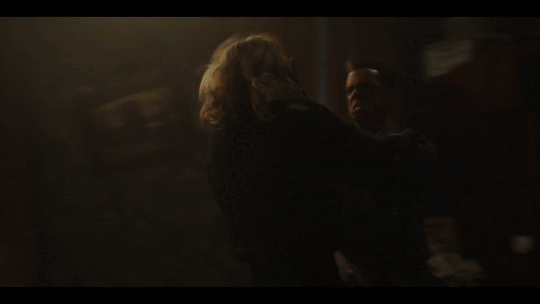
The Injuries
I wasn't the only one who saw Lestat's bloody face in the trailer and was like Ok, we're off to the races now! Cuz this implies SEVERAL things, some I'm more interested than others:
Lestat being bloody in and of itself doesn't surprise me--as seen in the film, even Claudia cut Les hard enough to made him bleed (more on that below). And we know there were MULTIPLE times Loustat physically fought, where Lestat (deservedly, he admitted) caught Louis' hands. However, I'm most curious about how long it took Les to HEAL.
AMC frustratingly does not follow a lot of the diehard Rules(TM) of AR's vampire universe (daywalking, being awake b4 sunset, smoking/drinking/eating/etc, Louis having the Fire Gift, etc).
How impervious they are to physical injury is another large point of contention, particularly when it comes to Ep5 & Ep6, when we see the full extent of Louis' injuries at Lestat's hands; and then see Louis get his payback after the hate-sex.


Especially cuz in the books/film, these kinds of open wounds/bruises shouldn't actually be a thing! Vamp skin/flesh is VERY tough & resilient--we know as early as TVL & QotD that old/strong vamps are darn near hard as stone, though ofc it's not until PLatRoA that we learn WHY (cuz of the Luracastria in their/Amel's blood). It's quite the feat to hurt them; hence why AR vamps often bite/cut their own flesh to help their mortal lovers drink their blood, as human teeth/nails can't pierce it. And any wounds they DO get heal very rapidly.
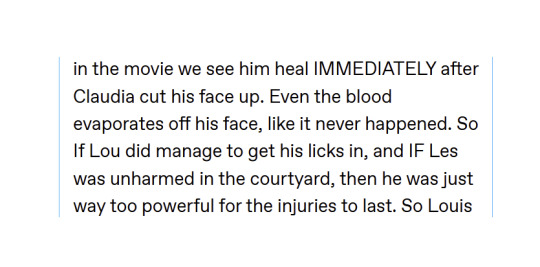
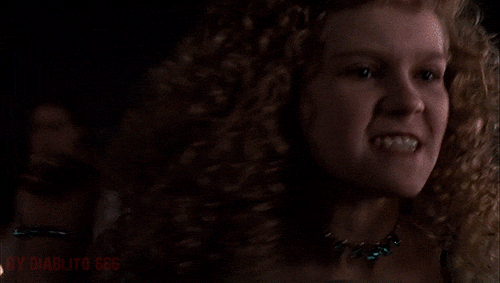
At the end of Ep5 Lestat floats down into the courtyard with a perfectly clean face. (Although his mouth was all bloody in the sky from having bitten Louis.)


But in their bedroom (BEFORE Lestat dragged them into the courtyard) Lestat's forehead and nose/mouth are bloody.
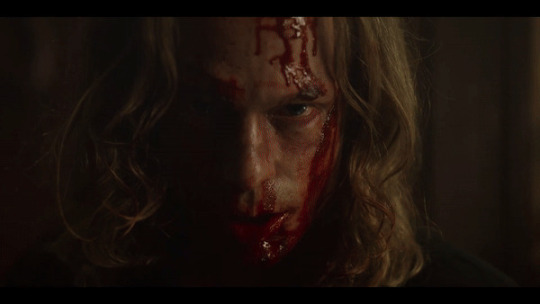
Until shown otherwise, I'm most willing to assume that Lestat was bloodied up, then his wounds rapidly healed & the blood evaporated, a la the film. What took Lestat mere minutes to recover from took Louis MONTHS on end. Cuz this was 1930/31, at the very peak of Louis' depression when he wasn't taking care of himself AT ALL. When Louis doesn't eat he is physically WEAK. But in his righteous indignation over Lestat choke-slamming Claudia, Lou's Papa Bear instincts/adrenaline allowed him to STAND UP & fight Les off of her.
There are MANY IRL cases where smaller/weaker people have been able to beat the crap out of much bigger/stronger opps--particularly if the opp isn't expecting it, or underestimates how serious/motivated their victim is (*cough* Ike vs Tina *cough*).
And ESPECIALLY if said opponent's deliberately HOLDING BACK and LETTING themselves get beat up. As we KNOW Lestat did!


This is the very heart of Loustat's power imbalance. No matter how strong Louis is/gets, Lestat is still stronger, & more experienced. Just cuz Lou managed to smack some sense into Les, doesn't mean Les was EVER in any real danger from Louis (esp. since AMC!Lou never even set Les on fire 😔). AMC's been demonstrating over & over how the game was rigged from the start. Lestat, the "finest ACTOR to ever walk our stage," OFTEN played with his food and PRETENDED to to be weaker, stupider, or more vulnerable than he REALLY was, Monsieur "Did I Not Tell You I Was Bad At Cards?" de Lioncourt. In Ep6, Lestat WANTED Louis to get mad at him, and did NOTHING to defend himself when Louis went FERAL on him.



I think Lestat was all bloodied up when they got back to NOLA cuz this was 1937. It's 6 years after Ep5, after Louis went through physical therapy so he could see & walk again--finally strong again--enough to swim the entire Mississippi River. That's what Lestat wanted most of all for Louis: healthiness & STRENGTH.


If letting Louis vent & feel empowered by beating him up would get Louis to crawl out of his passivity, Les would do ANYTHING for Louis--including playing along (a la the house rules w/ Claudia).

So like I said, until we're told otherwise, I hesitate to give Les a pass, cuz the show's literally been weaving a narrative that presents Lestat as the oppressor and Louis & Claudia as the oppressed. Oh, Les' pretty face got bloody? GOOD! Serves the narcissist right; it'll build character! 🤣
Traumatized Victims: Believable =/= Reliable
The other side of the argument, pointing out the contradictions between Ep5 & the trailer, inevitably goes back to the dreaded question of Louis' reliability as a narrator & believability as a victim.
Louis' 2022 recollections are FLAWED, not LIES (a la the petty AF skulldragging he did in 1973).

IMO, Louis' sincerity in seeking the TRUTH is what makes him 100% believable, even though he's OBVIOUSLY not 100% reliable. His memories are compromised, yes, but I DO NOT believe he is deliberately lying to Daniel in 2022. And it's already been established that book!Lestat VERIFIED that even when book!Lou contradicted himself, got details wrong, etc, his overall tale still captured the atmosphere of everything that went down, even at his utmost pettiest.
The ONLY outright "lie" Dubai!Lou tells Daniel is the whole "Rashid" ruse--but I strongly suspect that has WAY more to do with ARMAND and Devil's Minion (and AMC tryna throw us off the scent), than anything to do with Louis himself.
So yeah, regardless of Louis/Claudia getting it right about Lestat's face being bloody or not, S2 revisiting Ep5 I think will STILL capture the atmosphere of the toxic environment they were all living under, that culminated in what was obviously a REAL fight that DID happen, that was BAD enough that whatever happened to LOUIS--EFF Lestat, really, ffs--officially made Claudia mad enough to hate Lestat; and Louis guilty enough to go along with her Murder Plot.
41 notes
·
View notes
Text
Did Nicki really love Lestat?
I feel like there's sometimes a question in this fandom as to whether or not Nicki truly loved Lestat, or if it was all a 'ruse' of sorts. Some people will say that there was no love there, either at points, or just overall. But personally, I'm inclined to disagree. The way I see it, Nicki did genuinely love Lestat, especially at the beginning of their relationship.
They knew each other as children and, to an extent, they grew up together. This already puts them in a relatively close relationship with each other. This relationship between them starts out as just a friendship, but of course this evolves into something more.
When Nicki presents Lestat with the cloak, it's him who is acting rather flirty towards Lestat, not the other way around with him leaning into him and saying
"Only the impossible can do the impossible."
A week later when they're in the room at the inn, Nicki is the one who leans in and initiates that first show of intimacy, by kissing Lestat. Granted they were drunk at the time, but Nicki doesn't give me the impression he goes around kissing just anyone, even while intoxicated. I think the fact that they were drunk was just the perfect excuse/opportunity for Nicki to act on his feelings towards Lestat.
Further down the line, when they're in Paris - and at this point have been together for several months - Lestat returns to the theatre after his 'disappearance'. One of the first things the other actors do when Lestat initially arrives, is call Nicki to tell him that Lestat is back. And once he turns up to join the others in greeting Lestat, the actors immediately part to make way for Nicki to come through. I think they all knew there was a deeper level of connection between them. They share a very long and tender moment together, which the troupe allows without disturbance. Personally, I see that hug between them as coming from a place of love, heartbreak that they had been separated, and relief that they're back together again. Yes, Nicki had previously been, and still was angry and hurt that Lestat had supposedly left him, and without any warning. Especially considering Lestat was - as far as everyone else was concerned - perfectly fine during that time, only for him to turn up out of the blue with little to no explanation as to his whereabouts. I think Nicki's anger at this was partially down to Nicki being terrified at the thought he had lost his lover, and he couldn't hold his upset in.
Skipping forward to Nicki's turning, in my opinion, his very recently experienced trauma, combined with his already fragile mental state, were both amped up x100 by said turning.
The way I see it, Nicki got overwhelmed by the recent events and his mental condition clouded his mind causing him to lash out at the one person who he loved the most. Lestat. The reasoning for him lashing out at Lestat specifically, being because he was so immensely hurt by Lestat's disappearance, with him returning acting as though nothing had happened. This understandably angered Nicki, and mixed with his strong feelings for Lestat, it all bubbled up and exploded in their faces.
I think Nicki said what he said to Lestat during their last proper interaction, because he was deeply hurt and quite frankly, he just wasn't well. I don't think he was seeing/thinking clearly, and was probably also confused by the very sudden and drastic changes in his life. This led to him taking it all out on Lestat out of a need to blame someone for everything that had happened. Lestat just so happened to be the easiest and most obvious target for Nicki to let his anger out on.
Eleni tells Lestat in her letters to him, that even the mention of his name in Nicki's presence is enough to send Nicki over the edge. But I think this was down to his mental instability, along with his lingering hurt that had festered in his mind for so many years at that point; he wasn't in his right mind and so wasn't able to give appropriate reactions to his former lover.
Before Nicki goes into the fire, he gives his violin to Eleni, with the instruction to send it to Lestat. He also says how he had originally intended to give it to him the last time they saw each other, before Lestat left Paris. In my opinion, I don't see why Nicki would've had his violin that Lestat bought him, sent to Lestat, right before taking his own life. And there is a chance that he did this with malicious intent, as a way to taunt Lestat, but in my mind, I feel as though there was some lingering care left for him. I don't know that there was any love remaining on Nicki's part, I'll be honest, but I do there was some semblance of care left in him. I don't think this is something Nicki would admit to anyone, even himself, and I also don't know that he was aware of this - that it was more of a subconscious feeling. But I still think, regardless, there was something still in Nicki that cared even just a little bit for Lestat, albeit buried beneath the darkness in his mind.
Re: Nicki's interest in the violin and his comment about wanting to 'go down' in Paris, I think his initial interest in the violin was genuine. But when people around him *cough his father cough* told him to abandon the idea, that's when it turned into a thing of spite. However, I do believe there was still an honest love for playing. Even after Nicki had gone mad, playing the violin was something he turned to as a source of familiar comfort through his dark times.
As for Paris, it was Nicki's idea in the first place for both him and Lestat to run off (although, yes, it was more of a joke when he said it.) But I think he genuinely wanted him and Lestat to get away from the village that had been suffocating them both for so many years. When Nicki said he wanted them to 'go down', I think that was also as a result of his unstable mind, and his hurt at the recent events being taken out on Lestat. There may very well have been elements of truth in what he said, but overall, I think it's just yet another example of his inability to contain his pain.
Of course, none of this excuses the way Nicki treated Lestat in the end, but I think to simply say it was all because he didn't love Lestat is missing out on taking a deeper look into the reasons why he did and said those things. To denounce the love Nicki felt for Lestat seems unfair to me given his situation.
#this is something i've thought about an awful lot#can you tell i this is something that plagues my mind lmfao#this is the result of my moping over nickistat#lestat de lioncourt#nicolas de lenfent#nickistat#the vampire lestat#tvl#vampire chronicles#tvc#vc meta#my vampire chronicles
69 notes
·
View notes